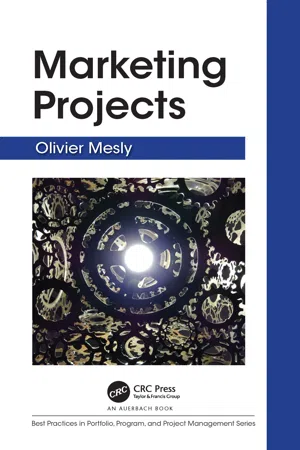
- 260 pages
- English
- ePUB (mobile friendly)
- Available on iOS & Android
Marketing Projects
About this book
Marketing is about placing a new product or service into the market. Projects are about delivering new products and services. The merger of these two fields holds great promise for delivering value to organizations and their clients. Project managers can serve many markets ranging from investors who fund projects to that of clients who use new products and services. Marketing Projects is a guide for helping project managers have projects funded or deliver value to end users. It is also a guide for marketing managers new to the world of project management.
The book begins by presenting the basics of both marketing and project management and highlights the aspects that are unique and relevant to both areas. It then explores marketing project feasibility and presents tools for assessing feasibility, which include the 6Ps of project management strategy:
- The project 4Ps: plan, processes, people, and power
- PRO: pessimistic, realistic, and optimistic scenarios
- POVs: points of vulnerability
- POE: point of equilibrium
- POW: product, organization, and work breakdown structures
- PWP: work psychodynamics
This book illustrates how to use these tools to market new projects to potential sponsors and investors. It then explores marketing projects to end users. Crucial to the success of projects are the relationships between project managers and clients and the way marketing experts implement their strategies. This book explains how project managers can develop meaningful relationships with clients to foster trust and have positive interactions.
Project managers excel at managing the processes for delivering new products and services. Marketers are keenly aware of latent, or unconscious needs, as well as those developing and emerging, and can provide project promoters and managers with exciting ideas. This book will help improve the mutual understanding between marketing and project managers, an effort ultimately benefiting end users, whether they be investors or customers. A better work atmosphere and a closer fit between marketing and project management objectives can only serve the interests of investors and end users, for whom marketers and project managers conceive and realize projects, one way or the other.
Tools to learn more effectively

Saving Books

Keyword Search

Annotating Text

Listen to it instead
Information
Chapter 1
What Is Marketing?

1.1 Introduction
1.2 What Is Marketing in the Context of Project Feasibility?1
1.3 Who Are the Marketing Experts?
1.4 Marketing for the Vast Majority
Table of contents
- Cover
- Half Title
- Series Page
- Title Page
- Copyright Page
- Dedication
- Table of Contents
- List of Abbreviations and Acronyms
- Preface
- Acknowledgments
- Authors
- I General Introduction
- 1 What Is Marketing?
- 2 What Is Marketing Management?
- 3 What Is a Project?
- 4 What Is Marketing Feasibility of Projects?
- 5 What Do Marketing Experts, Project Managers, and Clients Have in Common?
- 6 Testimonials
- Conclusion
- Bibliography
- Appendix 1: A Short Description of the Exercises Used during Our Seminars
- Appendix 2: The Core Psychodynamic Model
- Appendix 3: Arguable Errors Found in Marketing and Project Management Literature
- Index
Frequently asked questions
- Essential is ideal for learners and professionals who enjoy exploring a wide range of subjects. Access the Essential Library with 800,000+ trusted titles and best-sellers across business, personal growth, and the humanities. Includes unlimited reading time and Standard Read Aloud voice.
- Complete: Perfect for advanced learners and researchers needing full, unrestricted access. Unlock 1.4M+ books across hundreds of subjects, including academic and specialized titles. The Complete Plan also includes advanced features like Premium Read Aloud and Research Assistant.
Please note we cannot support devices running on iOS 13 and Android 7 or earlier. Learn more about using the app